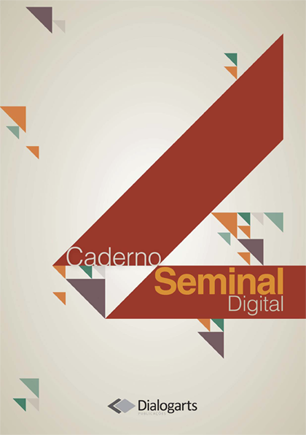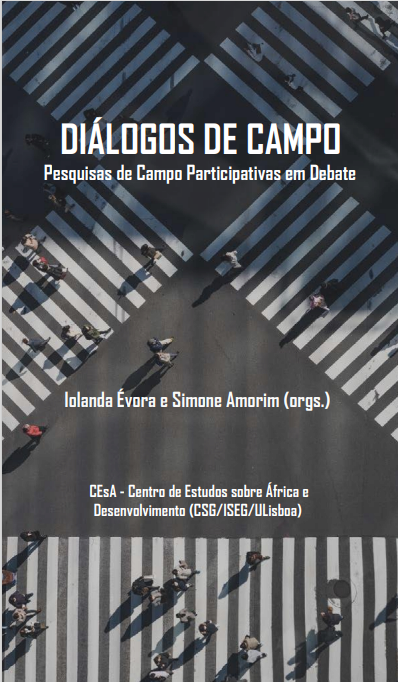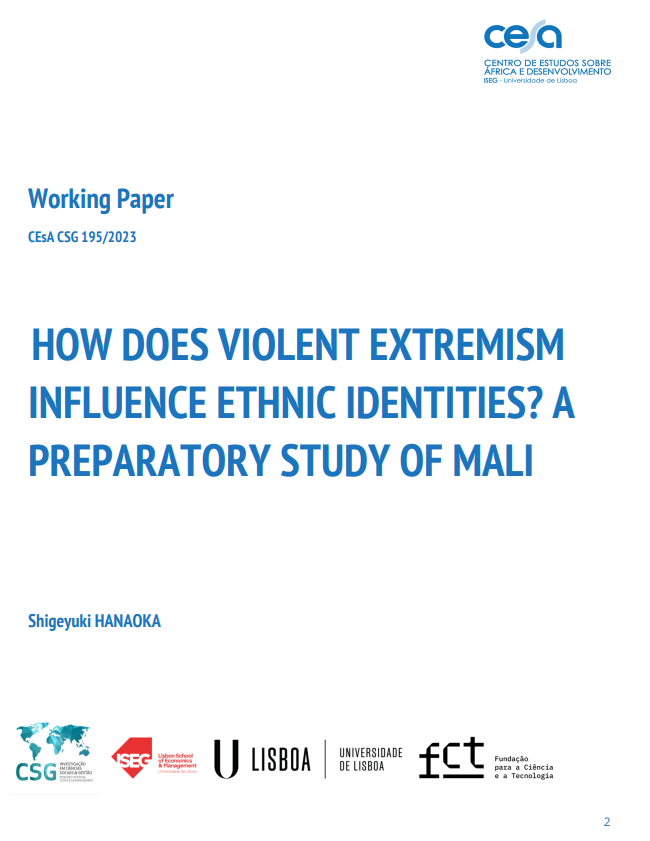Publications
For submission of articles or Working Papers to CEsA, please send an email to:
comunicacao@cesa.iseg.ulisboa.pt

Elementos Históricos e Ficcionalidade em Saga d’Ouro
Abstract:
This essay proposes an analysis of Saga d’Ouro (2019) by the Mozambican author Aurelio Furdela. In this Novel, our author skillfully blends historic information with literary art. The narrative takes place in Mwenemutapa, which covers Zimbabwe and a part of the land that is now Mozambique. Through the different stories of the characters, the author portrays the lives of different groups from various perspectives, including political, economic and cultural. Following H.R. Jauss and the Reception theory, the aim of our analysis is to understand the possible intention and critical relationship between past and present, to consider the current state of Mozambican society and its development model to understand the importance of the historical novel in preserving the memory of the past, avoiding the repetition of mistakes in the present.
Quotation:
Zhu, Anqi & Leite, A. M. (2023). “Elementos Históricos e Ficcionalidade em Saga D’Ouro”, In: A narrativa moçambicana no século XXI. Caderno Seminal Digital (n.º 45). Dialogarts. DOI DOI: http://dx.doi.org/10.12957/seminal.2023.79827

Memória e Identidade em Tornado, de Teresa Noronha
Abstract:
This essay proposes a brief study of Tornado (2021), by Teresa Noronha, focusing on the exploration of individual, collective, and post-colonial identities. The methodological framework will rely on a Memory Studies approach, contemplating concepts such as “trauma”, “collective memory”, “feminine countermemory”, and “memory wars”. We aim to recontextualize these conceptual tools beyond Holocaust studies, demonstrating their pertinence for the research put forth here. As such, we present a critical, feminist, and feminine reading of Noronha’s novel focused on its main character.
Quotation:
Aires e Castro, A. & Leite, A. M. (2023). “Memória e Identidade em Tornado, de Teresa Noronha”, In: A narrativa moçambicana no século XXI. Caderno Seminal Digital (n.º 45). Dialogarts. DOI http://dx.doi.org/10.12957/seminal.2023.79823

Crimes e Violência no Índico Moçambicano Rabhia de Lucílio Manjate e a Ilha dos Mulatos de Sérgio Raimundo
Abstract:
This article focuses on two contemporary Mozambican novels: Rabhia by Lucílio Manjate, published in 2017 and A Ilha dos Mulatos by Sérgio Raimundo, published in 2020. Although with different structures and narrative options, as will be seen throughout the article, both the novels look at contemporary Mozambican society through the prism of crime and mystery, providing a multifaceted portrait of post-coloniality in this African country. As will be seen, in these narratives, postcoloniality emerges marked by conflicting memories and complex gender, racial and inter-generational relations, as the result of the multiple situations of violence experienced by the country during historical, political and economic transitions. On the other hand, in both narratives, the representation of the millenary historical and identity relationship between Mozambique and the universe of the Indian Ocean will be analysed, approaching the topics of migration, racial and cultural miscegenation, as well as the diffusion of Islam as a transnational religious and cultural element.
Quotation:
Falconi, J. (2023). “Crimes e Violência no Índico Moçambicano Rabhia de Lucílio Manjate e a Ilha dos Mulatos de Sérgio Raimundo”, In: A narrativa moçambicana no século XXI. Caderno Seminal Digital (n.º 45). Dialogarts. DOI http://dx.doi.org/10.12957/seminal.2023.79831

A Categoria de Poético e a Meditação sobre a Escrita em Marizza de Mélio Tinga
Abstract:
This essay presents a brief study on the novel Marizza (2021), by Mélio Tinga, based on the study and conception of the poetic record that the narrative organizes, as well as on its metanarrative organization, of meditation on writing. The recomposition of the myth of Orpheus in the novel, as well as a set of fragmentary intertexts that compose it, allows the reader to understand the reflective, and somewhat philosophical, dimension that the author and narrator make about beauty, love, passion and about literary life as an institution (writing, edition, proofreading, reception and circulation of the book).
Quotation:
Jeremias, R. M. & Leite, A. M. (2023). “A Categoria de Poético e a Meditação sobre a Escrita em Marizza de Mélio Tinga”, In: A narrativa moçambicana no século XXI. Caderno Seminal Digital (n.º 45). Dialogarts. DOI http://dx.doi.org/10.12957/seminal.2023.79832

Cultura, Cristianismo e Modernidade no Romance Mueda nos Labirintos dos Ritos de Iniciação de Carlos Paradona Rufino Roque
Abstract:
The theme “Culture, Christianity and Modernity in the novel ‘Mueda: nos labirintos dos ritos de iniciação’ by Carlos Paradona Rufino Roque” focuses on the initiation rites of Mozambican culture in the encounter with Christianity and Modernity. Stage of the novel, Mueda is a village in the Cabo Delgado province and the cultural capital of the Makonde people. The aim of the work is to compare the constitutive elements of the initiation rites with the classic myth. Tempering history and fiction, the novel reveals the mysteries of the initiatory liturgy and the syncretic environment of the inhabitants of Mueda, the target of the author’s criticism. The search for the most beautiful young woman through the initiation rites, attracts young people to Mueda. The aim is to conquer the most beautiful woman, which inscribes the novel on the same level as the classical myths such as Paris and Helen or Hippomenes and Atalanta.
Quotation:
Nachivango, P. V. N. & Leite, A. M. (2023). “Cultura, Cristianismo e Modernidade no Romance Mueda nos Labirintos dos Ritos de Iniciação de Carlos Paradona Rufino Roque”, In: A narrativa moçambicana no século XXI. Caderno Seminal Digital (n.º 45). Dialogarts. DOI http://dx.doi.org/10.12957/seminal.2023.79834

O Recente Cenário Literário de Maputo: Notas de Campo
Abstract:
Using the ethnographic tool of the “Field Diary”, resulting from participant observation and photographic recordings carried out in Maputo, between September and October 2022, the main objective of the text is to articulate the current literary scenario of the city with its geography, analyzing permanencies and transformations that are established in the constant dispute between memory and oblivion.
Quotation:
Gallo, F. (2023). “O Recente Cenário Literário de Maputo: Notas de Campo”, In: A narrativa moçambicana no século XXI. Caderno Seminal Digital (n.º 45). Dialogarts. DOI http://dx.doi.org/10.12957/seminal.2023.79835

Modelos de Construção do Romance Africano em Nyembête ou As Cores da Lágrima
Abstract:
This study is based on Calane da Silva’s proposal, as an essayist, on the writing of the new African novel for the 21th century, which in my view still needs debate, but which can already be analyzed from the author’s own proposal, in his novel Nyembête ou as cores da lágrima. I demonstrate, with this research, the characteristics that allow us to accept the work as a formation novel, a designation that I borrow from Puga (2016). I argue that it is a narrative with neo-romantic elements, namely polyphony and death with the possibility of return, factually found in the Traditional Bantu Culture and in the Apostolic Catholic Tradition, and I also consider its perspective of a self-fictional novel (Faedrich, 2015), bearer of biographical marks of its author. In developing this research, I do so in the knowledge that it is a different conception of writing than what is usual to find in Calane da Silva – prose writer and short story writer (because he was also a poet). Added to this, in this article I observe that the author takes an approach to spirituality, centered on his studies on Spiritual Anthropology.
Quotation:
Laisse, S. J. (2023). “Modelos de Construção do Romance Africano em Nyembête ou as Cores da Lágrima”, In: A narrativa moçambicana no século XXI. Caderno Seminal Digital (n.º 45). Dialogarts. DOI http://dx.doi.org/10.12957/seminal.2023.79833

Subversão do Romance Policial e Questões de Memória em A Ilha dos Mulatos
Abstract:
This article presents a study about A Ilha dos Mulatos (2020), by Sérgio Raimundo, based on the structure of the detective novel, which is subverted and expanded to the level of narration, creating a game of masks in order to uncover the narrative voices. It deals with the theories of memory and the way memory is treated in the novel, unfolding in the notion of post-memory. Articulating memory as one of the necessary elements for the discovery of the guilty in the framework of the crime novel, we verify that it also turns out to be subverted in the writing of this novel.
Quotation:
Jeremias, R. & Leite, A. M. (2023). “Subversão do Romance Policial e Questões de Memória em A Ilha dos Mulatos”, In: A narrativa moçambicana no século XXI. Caderno Seminal Digital (n.º 45). Dialogarts. DOI http://dx.doi.org/10.12957/seminal.2023.79829

Diálogos de Campo – Pesquisas de Campo Participativas em Debate
Abstract:
This volume brings together concerns that serve as the basis for a continued debate on the mutual implications of research in the field of Social Sciences. The texts start from the common observation about the weakening of demands about “how we do it” in social research and deal with aspects related to fieldwork that are increasingly losing space in academia, essentially focused on producing results. From the fields of Social Sciences, Cinema, Literature, and Psychology, among others, the themes move between the dimensions of power hierarchies in research and the contexts that exponentiate them; the position and positionality of the researcher, and where we are placed by our interlocutors or people in the situations addressed. Specifically, they reflect on participatory methodologies and changes in knowledge production; ethnography and epistemic decolonization when the researcher does research in their life context; the interferences and determinations dictated by the field, during research; collaborative or participatory research, whether with refugee associations, in the field of artistic training or action research on bicycles and the city. Furthermore, the researcher’s subjectivity and writing regarding anti-racist cinema are addressed; as the implications of the researchers themselves in researching topics such as the impact of the pandemic on women, cultural heritage, or an object present, simultaneously, on different continents. The classic questions of the debate on methodology are present, which are, in fact, the foundations of current affairs, bringing different nuances of the contemporary debate, in social research, at a time when easier access to information reduces the distance and access of society (and the subjects of social research) to the knowledge about themselves produced in academia. This book was designed within the scope of the methodology workshops of the Afro-Port project (FCT/CEsA) and coincides with the project’s objective of contributing to a program in horizontal methodology and grounded methodology that is original, innovative and transdisciplinary, sustained by the interest in dialogue between academic and non-academic/scientific and non-scientific discourse.
Quotation:
Évora, I. e Amorim, S. (2023). “Diálogos de Campo – Pesquisas de Campo Participativas em Debate”. Lisboa, CEsA/CSG. ISBN 978-989-54687-4-4

Working Paper 195/2023: How Does Violent Extremism Influence Ethnic Identities? A Preparatory Study Of Mali
Abstract:
How does violent extremism (VE) impact individuals’ ethnic identities? While there is a broad body of research on VE, which has seen significant growth in Africa in recent years, including assessments of its origins, the coalescence of various movements, and military operations against VE, research on its impact on ethnic identity and its associated political behaviours remains limited. This work serves as a preparatory study to examine how people’s perceptions, and political behaviours related to ethnic identity have evolved during the period of VE’s substantial expansion in Mali in recent years.
Quotation:
Hanaoka, Shigeyuki (2023). “How Does Violent Extremism Influence Ethnic Identities? A Preparatory Study Of Mali”. CEsA/CGS – Documentos de trabalho nº 195/2023





